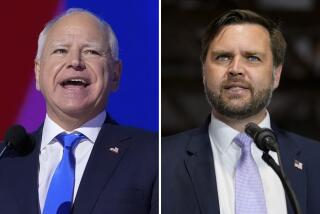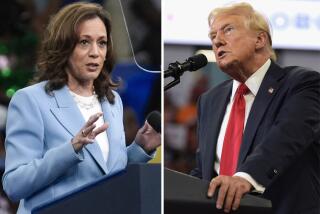Different Challenges Await Bush, Dukakis in Debate
- Share via
WASHINGTON — The two presidential candidates confront each other in Los Angeles tonight in the last scheduled televised debate of the 1988 campaign with sharply different strategies and objectives.
Advisers to front-runner George Bush claim he needs to use the occasion only to consolidate the narrow but thus-far steady lead he has held since the Republican convention nominated him eight weeks ago. “All Bush has to do is reinforce the votes he already has,” said Eddie Mahe, a GOP consultant and adviser to the Bush campaign. “He doesn’t need any more.”
Underdog Michael S. Dukakis, as his aides acknowledge, faces a more formidable challenge.
The debate represents the Democratic nominee’s last clear opportunity to begin doing what he must do to win: gathering to his banner a majority of the still-undecided voters while persuading some significant number of Bush supporters to reconsider their presidential preference.
Unforeseeable events--or strategic breakthroughs by Dukakis--could still alter the landscape and propel the Massachusetts governor into the lead after tomorrow night. But the debate, which is expected to draw a national television audience of about 100 million, is the last such face-to-face encounter on the campaign schedule and thus offers the Democrat a priceless opportunity.
And at the labyrinthine Dukakis headquarters on Chauncy Street in downtown Boston, no one from the candidate on down underestimates the difficulty of Dukakis’ task. He is “charged up for the debate,” said an upper level staffer, but “he knows that regardless of the debate, it’s going to be tough from here on out.”
The irrefutable calculus of the polls limned the strategic realities facing both candidates less than a month from Election Day. Four public surveys taken within the past 10 days put Bush in front of Dukakis by margins ranging from three to seven percentage points.
Those figures, as Dukakis backers were quick to point out, suggest their man remains well within striking distance of the vice president. Also citing poll results, however, Bush supporters argue that Dukakis, who saw a double-digit lead evaporate after the GOP convention in August and who then rallied somewhat, still has made almost no significant inroads into Bush’s base of support in recent weeks.
Moreover, GOP strategists point out, opinion polls at the state level indicate that Bush’s advantage in the electoral college, where the election will actually be decided, may be much greater than the national opinion surveys suggest.
These statistics fostered a confident and seemingly relaxed attitude among Bush strategists here in Washington about the debate.
Display Anxiety
By contrast, the attitude in Chauncy Street is a good deal more anxious.
“He needs a knockout,” said one worried staffer assessing Dukakis’ prospects.
Cooler heads in the Dukakis camp argue that, given the vigorous political style Bush has demonstrated since his memorable convention acceptance speech, a KO is unlikely.
And they argue that it would be bad strategy to seek one. Rather than attack Bush and risk alienating voters, they believe the Massachusetts governor should concentrate on making himself more human as a candidate and thus more appealing as a President.
This belief is buttressed by the polling evidence on the impact of the first presidential debate last month in North Carolina. Opinion surveys showed that most viewers thought Dukakis won that contest by seeming crisper and more knowledgeable than Bush. But polls indicated Dukakis gained little or no ground in the only contest that counts--the race for the presidency.
Projects Relaxed Personality
Dukakis aides attribute that result to Bush’s ability to project himself as a more relaxed, warmer personality. While Dukakis at times seemed smug and self-satisfied, the vice president projected himself as “congenial and very likable,” one Dukakis aide conceded, and “even managed to smile” while he was lambasting his opponent’s record.
In the first debate, Dukakis “felt he had to convince the people he was in the league, that he could play the game,” explained Rep. Tony Coelho of Merced, the third-ranking member of the House Democratic leadership, who flew to California with Dukakis.
Tonight, Coelho asserted, voters will want “to see if he (Dukakis) is the type of guy you want to invite over for a cocktail or barbecue.” Right now, Coelho said, “they’d rather have George Bush, who they don’t like, than a blind date. Dukakis has got to stop being the blind date. If he projects warmth, he’s got it.”
Of course, as his own loyalists admit, Dukakis is not the sort of politician who naturally radiates affability. “The governor is a very private man,” one staffer acknowledged.
But another adviser contended: “He doesn’t need to be Mr. Rogers. He just has to show that he’s not an automaton.”
Mindful of Problem
The governor himself seems mindful of his personality problem and willing to try to solve it. Conceding in a recent television interview that he might “occasionally be a little calmer and maybe not quite as excitable as some people,” Dukakis added that he cares deeply about the country and its people and “will express that” in the debate.
Beyond demonstrating warmth, Dukakis strategists also intend for their candidate to offer voters a strong, positive message. While Dukakis will respond to any attacks from Bush, said campaign manager Susan Estrich, he hopes to use much of his time during the debate to underline “positive proposals” he has made during the campaign on such issues as housing and health care.
“Clearly the most important thing for the American people is, who do they trust with the future of the country,” Estrich said. “There’s no question but that we’re the underdogs, but we’ll be trying to make that affirmative case.”
Dukakis strategists are hoping he will find a more receptive environment for his proposals because of the fallout from last week’s vice presidential debate. Most surveys showed Dukakis’ running mate, Texas Sen. Lloyd Bentsen, far outshined the GOP vice presidential nominee, Indiana Sen. Dan Quayle.
Campaign vice chairman John Sasso claimed that polling results showed “serious doubts” about Quayle’s qualifications. “People are really tuning in now,” he said.
But Bush campaign manager Lee Atwater scoffed at the notion that Quayle would hurt Bush’s chances. “They (the Democrats) will do all right if they can make it an issue,” he said, “but 200 years of history is working against them. They’re wasting their time. The people vote for the President, not the vice president.”
Did Not Dismay Backers
As for Bush, his advisers say they would be satisfied if he could do no worse than his performance last month in North Carolina. Apart from some occasional verbal lapses and distracting gestures, he did nothing to dismay his supporters.
“There’ll be no great shift in strategy” for Bush in the second debate, Atwater said. “He did well the first time and he’ll do well this time.”
Bush himself seemed satisfied with his own performance, telling reporters Wednesday after breakfasting at Los Angeles’ Four Seasons Hotel that he hoped “to accomplish in this session what I accomplished in the first session. . . . It seemed to work all right. We do tend to be a little stronger politically.”
Nevertheless, Bush indicated that there was room for improvement. He said he wanted “to spell out in a broader sense” how “I would like to lead this country” and “where I would like to see us be in the ‘90s.”
More important than facts and figures, he said, was getting across to voters “what my heartbeat is, what I really care about.”
And for all the lofty talk, GOP operatives indicated that Bush would not hesitate to hit out at Dukakis if the chance presented itself. “He has to take the opportunity to define Dukakis as out of synch with the voters,” said pollster Linda DiVall, a senior adviser to the Bush campaign.
Asked about criticism that his characterizations of Dukakis as an ultra-liberal have been overly negative, Bush told reporters that he was only trying “to make him be what he is. . . . I have to be what I am, and he can’t run away from his past.”
Staff writers John Balzar and James Gerstenzang contributed to this story.
More to Read
Get the L.A. Times Politics newsletter
Deeply reported insights into legislation, politics and policy from Sacramento, Washington and beyond. In your inbox twice per week.
You may occasionally receive promotional content from the Los Angeles Times.










